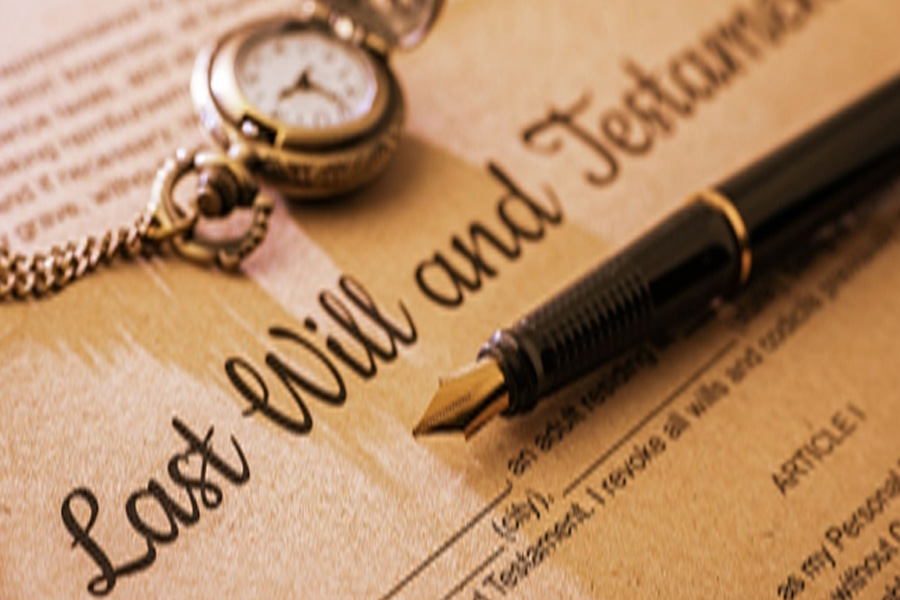What does a last will and testament mean?
A last will and testament is a legal document that communicates a person’s final wishes pertaining to possessions and dependents.
A will or testament is a legal document by which a person, the testator, expresses their wishes as to how their property is to be distributed at death, and names one or more persons, the executor, to manage the estate until its final distribution.
In the Philippines, wills should be written (and cannot be in any other form, i.e., audio or video recording). Moreover, any person 18 years old and above, with a sound mind, can prepare a will without the aid of a lawyer.
The person who creates the will is called a testator, while recipients are called heirs. Strictly speaking, one only becomes an heir upon the death of the testator. Though other countries accept oral wills, only written wills are accepted in the Philippines.
What is the difference between a living will and a last will and testament?
A Last Will and Testament dictates the way that that your assets will be distributed and utilized following your death. A Living Will states your wishes regarding life support in the event that you are in a persistent vegetative state or irreversible coma and cannot communicate your wishes.
What does it take for a will to be valid?
The will must have been executed with testamentary intent; the testator must have had testamentary capacity: The will must have been executed free of fraud, duress, undue influence or mistake; and. The will must have been duly executed through a proper ceremony.
How to Write My Own Will
1. Write the introduction to the will. Start by clearly labeling the document “Last Will and Testament.”…
2. Select an executor. …
3. Identify your heirs. …
4. Name a guardian for any minor or dependent children. …
5. Assess and divide your property. …
6. Sign the will. …
7. Ask witnesses to sign the will.
Two Main Kinds of Wills
1. Notarial Will
• Requires at least three credible witnesses
• Acknowledged by a notary public that it was made by the testator
• and many other legal requirements
2. Holographic Will
• A will that’s entirely handwritten, dated and signed by the testator
• … much simpler and with less legal formalities and requirements
Is Holographic Will legal in the Philippines?
There are two kinds of wills — holographic and notarial. A holographic will must be entirely written, dated, and signed by the hand of the testator himself. It is subject to no other form, and may be made in or out of the Philippines, and need not be witnessed (Article 810, Civil Code).
Compulsory heirs
The testator can choose his heirs, the will he created cannot prejudice the legitimate, or forced share, of his compulsory heirs.
The law has reserved portions of the testator’s estate to compulsory heirs, which are: legitimate children or descendants, legitimate parents or ascendants, surviving spouse, and illegitimate children.
In other words, the testator cannot disinherit leave out the compulsory heirs without sufficient legal cause. Should they be disinherited, however, it must be stated in the will that the testator has created.
Making a will
In making a will, the testator can include any prerequisite for an inheritor’s acquisition of his wealth, provided that guidelines stated in the civil code should are followed.
“Our law in succession is based on the old Spanish civil code so it probably survived from that era. A testator can put in a tradition, for example, that the surviving spouse shall not marry again,”
However, the testator cannot include as a requirement that the heir should first commit an illegal, immoral, or any act against the law in order to get his share of the estate.
The testator can pass on all that he owns to his inheritors, this does not include debts and obligations.
After the testator dies, a probate proceeding may be initiated in court to determine the validity of the will that the testator may have created.
If the will is ruled to be invalid, the inheritance will take place under the laws of intestacy as if a will was never made. In this process, the law will decide how to dispose of the deceased person’s estate.
“Intestate succession happens when no will is made. It provides certain proportions to certain people. It’s a straightforward application of the provisions of the law.
When the will has been executed in accordance with law, then comes the settlement of claims. At this stage, all heirs will be notified so they can get their share of the testator’s property. This stage, taxes and other expenses will be deducted from the testator’s property.
“A notarial will includes the legal cost, for the notary public, for the lawyer who will assist the testator, and in filing for the probate of a will, the rules of court provide for the estates where the property is not more than P100, 000 then the filing fees would be P3, 500. For P400, 000 of total properties, it’s about P6, 500,”
“Article 810. A person may execute a holographic will which must be entirely written, dated and signed by the hand of the testator himself. It is subject to no other form, and may be made in or out of the Philippines, and need not be witnessed.”
What is probate?
Probate is a court process that ensures that the wills follow the law in such things as compulsory heirs in addition to the actual form of the will. It requires filing the will in court. It also requires filing evidence of the validity of the will. For the completely handwritten or holographic will, handwriting samples must be submitted. For a notarial will, the witnesses may be called. While some of the proof needed is standard, others may depend on the situation and whether or not someone does not agree with the will (i.e. the will is contested).
Does a will have to go to probate?
Yes, a will must go through Probate before any assets are transferred. In the Philippines, the court decision is a necessary requirement by government bodies or companies to transfer real property or stocks in the names of the heirs. The properties cannot be transferred without this process. The properties would remain in the name of the deceased until this process is completed – and this can lead to serious issues down the road.
Does a foreign will probated abroad still have to be probated in the Philippines?
Yes. The foreign will must still go to Philippine courts so that it can be proved that the will is valid.
There are some common situations where this applies:
• If the deceased was a foreigner regarding Philippine property/stock
• If the deceased was a Filipino/dual citizen who created a will abroad regarding Philippine property/stock.
Administrative bodies will not transfer Philippine real property or stocks without the Philippine court’s decision, so probate becomes a necessary step before transferring inherited property or selling it.
Can a foreign will be probated in the Philippines without probate abroad?
Yes. It is not a requirement that a foreign will be probated abroad before being probated in the Philippines. [G.R. 169144, Jan 2011]. So, say you have a Filipino aunt who died abroad and who left you property in a will. This will can be probated in the Philippines without probate abroad. This will validate the will and allow transfer of property.
Where is a will probated?
A will is probated in the city/municipality of the deceased permanent residence. If he has permanent residence abroad, then the will is probated where the land is located. The case is filed at the Regional Trial Court.
Can my will be probated while I am still alive?
Yes, a will can be probated while you are still alive. Probating a will while the testator is alive can be very effective. The court can see for itself that the person creating the will is of sound mind. The court can also more easily ensure that the will really come from the testator and that it faithfully explains his wishes.
What is the process of probating a will?
Probating a will can be filed by anyone with an interest in the estate, or even the person who made the will himself (the “testator”). Publication for 3 consecutive weeks is required and notice shall be delivered to the known heirs, legatees and devisees. Testimony will be required to prove the will. Should the will be uncontested it is of course much faster than when a will is contested, in which case the court will render its decision.
Is a “will” the same as “inheritance”?
No. A will is different from inheritance, which “includes all the property, rights and obligations of a person which are not extinguished by his death” (Civil Code, Art. 776). In other words, the basic difference between a “will” and “inheritance” is that a “will” is the document that determines the disposition of the “inheritance”.
What happens if there’s no will or if a will is not probated?
A will enables a person to have control over the disposition of his/her estate. In the absence of a will, the general provisions of law govern the disposition of the estate of the deceased person. The proceedings in the absence of a will is called “intestate proceedings.”
Who are the legal heirs of a deceased person in the Philippines?
The order of hereditary or intestate succession, if the deceased was a legitimate child, is as follows:
• Legitimate children or descendants;
• Legitimate parents or ascendants;
• Illegitimate children or descendants;
• Surviving spouse;
• Brothers and sisters, nephews and nieces;
Who are the legal heirs?
Legal Heir certificates are issued by the tahsildar of the district to recognize the actual deceased person living heirs and the succession certificates are issued by the court to the deceased person legal heirs. Legal Heir Certificate: Son, daughter, husband, wife, parents of the deceased person can apply.
Who receives inheritance?
Devisee: Someone who inherits real estate through a will. Executor: The person named in a will, and appointed by the probate court after the will-maker’s death, to wind up the affairs of a deceased person. In some states, executors are called “personal representatives.”
How much is the inheritance tax in the Philippines?
Previously, a tax based on the value of the net estate of the decedent, whether resident or nonresident of the Philippines, was computed based on a tax schedule where an estate worth P200, 000 and over was taxed from 5 percent to 20 percent. Under the TRAIN law, it will now be subject to a flat rate of 6 percent.
What is inheritance tax?
Inheritance tax is a levy paid by an individual who inherits money or property from another person. The tax amount that the beneficiary pays depends on where they are, as tax laws differ between states and countries.
While some laws define inheritance tax and estate tax as one and the same, others keep the two separate. For most, estate taxes are generally defined as taxes that are assessed on the assets or estate of the deceased, while inheritance taxes are assessed on the inheritances received by the beneficiaries.
How is inheritance tax defined in the Philippines?
In the Philippines, inheritance tax is the same as estate tax. It is defined by the Bureau of Internal Revenue (BIR) as thus:
Philippine estate taxes are paid by the heirs, beneficiaries, executor, or the administrator in order to transfer property to beneficiaries or heirs upon the decedent’s passing. While calculated against the value of the net estate, it is not considered a tax on property because it is only imposed at the time of the estate owner’s death.


Recent Comments